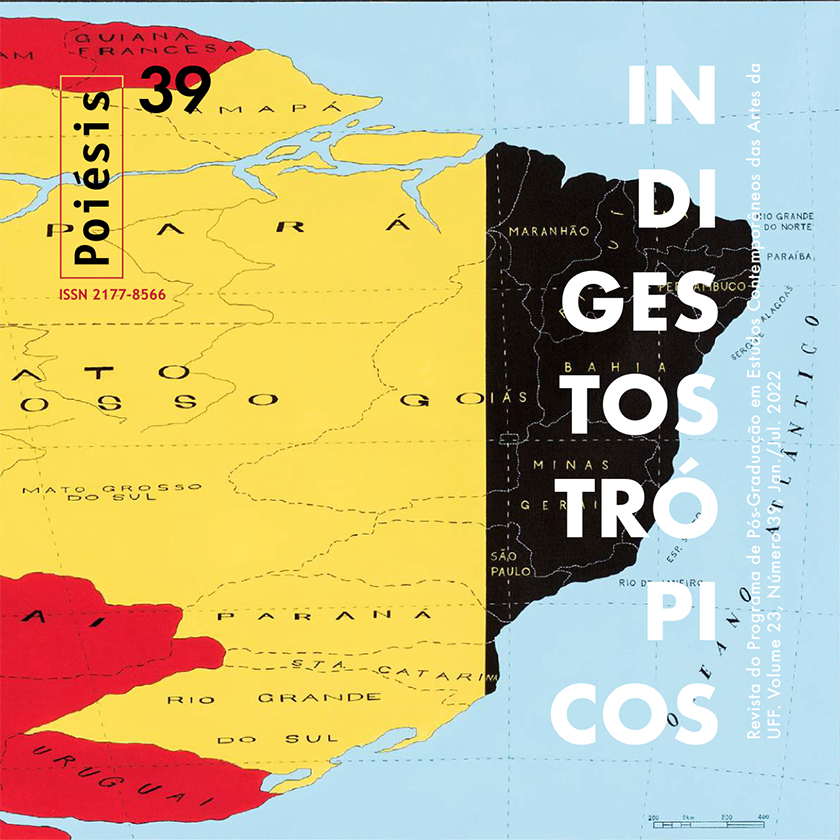A arte brasileira não se resume ao eixo Rio de Janeiro-São Paulo: sotaques poéticos do nordeste por uma urgente história da arte
DOI:
https://doi.org/10.22409/poiesis.v23i39.52943Palavras-chave:
Sotaque poético; arte brasileira; nordeste brasileiroResumo
Esse texto, a partir da apropriação do termo sotaque do campo da linguística, aposta na dimensão plural da produção artística contemporânea do/no nordeste brasileiro, com o objetivo de estabelecer rupturas na/com a história da arte nacional, tradicionalmente narrada a partir do eixo Rio de Janeiro/São Paulo. Para tal, divido em três tópicos, que podem ser lidos na ordem que se preferir, o texto costura reflexões acerca do lugar do nordeste no sistema de arte nacional, com debates históricos, poéticos, estéticos, políticos e sociais que se estabelecem entre as regiões nordeste e sudeste. Sendo assim, cada parte do texto, mobiliza um escopo de referências teóricas e artísticas, provocando a ideia de sotaques poéticos para demarcar territórios propositivos para a formulação de muitos (outros) mapas (im)possíveis da arte brasileira.
Downloads
Referências
ALMEIDA, Diogo; ALMEIDA, Luana. Artistas da Paraíba ressaltam a importância do Dia do Orgulho LGBTQ+.
G1 Paraíba. Disponível em: https://g1.globo.com/pb/paraiba/noticia/2020/06/28/artistas-da-paraiba-ressaltam-a-importancia-do-dia-do-orgulho-lgbtq.ghtml Acessado em: 20 de outubro de 2021.
ALBUQUERQUE JUNIOR, Durval Muniz de. A invenção do Nordeste e outras artes. São Paulo: Cortez, 2011
ALBUQUERQUE JUNIOR, Durval Muniz de. Nordestino: Invenção do “falo” uma história do gênero masculino [1920-1940]. São Paulo. Intermeios, 2013.
AKOTIRENE, Carla. Interseccionalidade. São Paulo: Pólem, 2019.
ANDRADE. Mika. O olho de Lilith. Ferina. Fortaleza, 2019.
BANDEIRA, A. M. A teoria Queer em uma perspectiva brasileira: escritos para tempos de incertezas. Revista Arqueologia Pública, Campinas, SP, v. 13, n. 1[22], p. 34–53, 2019. Disponível em: https://periodicos.sbu.unicamp.br/ojs/index.php/rap/article/view/8654815. Acesso em: 21 out. 2021.
BENTO, Berenice. Transviad@s: gênero, sexualidade e direitos humanos. Salvador: EDUFBA, 2017.
BUTLER, Judith. Corpos em Aliança e a política das ruas: notas para uma teoria performativa de assembleia. Rio de Janeiro: Civilização brasileira, 2018.
CARULHA, Gabriel. Bixarte: As diversas faces de uma trans não binária dentro do Rap. Brasil de Fato Paraíba, 2019. Disponível em: https://www.brasildefatopb.com.br/2019/11/16/bixarte-as-diversas-faces-de-uma--trans-nao-binaria-dentro-do-rap Acessado em: 21 de outubro de 2021
FLORENCIO. Thiago. Nativo Ausente. Rio de Janeiro. Imandaia, 2020.
FOUCAULT, Michel. História da Sexualidade 1: A vontade de saber. Rio de Janeiro. Paz e Terra. 2014
HALL, Stuart. Cultura e Representação. Rio de Janeiro: Ed. PUC-Rio; Apicuri, 2016.
HOLANDA. Sergio Buarque de. Raizes do Brasil. José Olímpio. São Paulo 1998.
LACOMBE, Fabiano. O Conceito de Indústria Cultural: Leituras na Contemporaneidade. Entremeios: Revista Discente do da Pós-Graduação em Comunicação Social da PUC -Rio. Edição 15, vol 1, jan-jun/2019. Disponível em: http://entremeios.com.puc-rio.br/media/11%20Lacombe%20ind.pdf Acessado em: 20 de outubro de 2021.
MISKOLCI, Richard. Teoria Queer: Um aprendizado pelas diferenças. Belo Horizonte: Autêntica Editora; UFOP, 2020.
MOMBAÇA, Jota. Rumo a uma redistribuição desobediente de gênero e anticolonial da violência. São Paulo: Fundação Bienal de São Paulo, 2016.
RUFINO. Luis. Encantamento: sobre política de vida. Rio de Janeiro. MV editora, 2020.
SUÊNIA ANE. Cantor, compositor e ‘artivista’, homem trans usa arte como refúgio para conquistar espaço. G1 Paraíba, 2020. Disponível em: https://g1.globo.com/pb/paraiba/noticia/2020/01/31/cantor-compositor-e-artivista-homem-trans-usa-arte-como-refugio-para-conquistar-espaco.ghtml Acessado em 21 out. 2021.
Publicado
Edição
Seção
Licença
Copyright (c) 2022 Eduardo Bruno, João Paulo Lima, Wadírio Castro

Este trabalho está licenciado sob uma licença Creative Commons Attribution-NonCommercial-NoDerivatives 4.0 International License.
Autores(as) que publicam na Revista Poiésis concordam com os seguintes termos:
- Os(as) autores(as) mantêm os direitos autorais e concedem à revista o direito de primeira publicação. O trabalho é automaticamente licenciado sob a Licença Creative Commons Attribution, o que permite o seu compartilhamento desde que seja feito o reconhecimento da autoria e da publicação inicial nesta revista.
- Os(as) autores(as) têm permissão e são estimulados a distribuir online seu trabalho publicado na Revista Poiésis (em repositórios institucionais ou em sua própria página pessoal), uma vez que isso pode gerar interações produtivas, bem como aumentar o impacto e a citação do trabalho publicado (Veja O Efeito do Acesso Livre).


